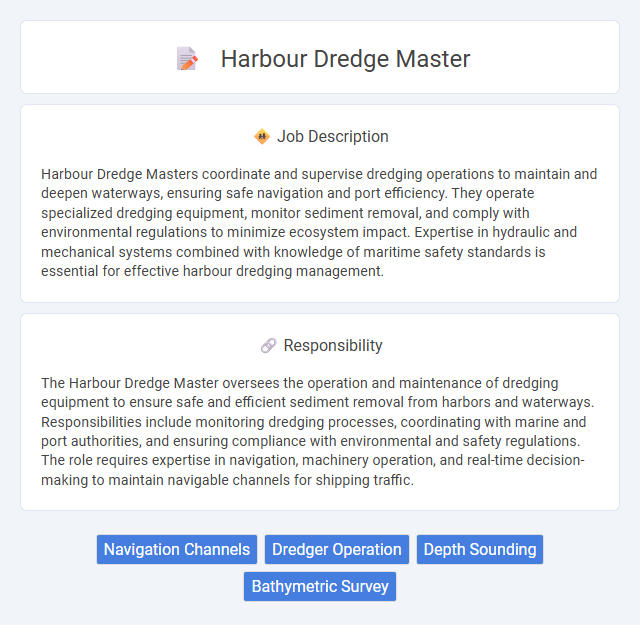
Harbour Dredge Masters coordinate and supervise dredging operations to maintain and deepen waterways, ensuring safe navigation and port efficiency. They operate specialized dredging equipment, monitor sediment removal, and comply with environmental regulations to minimize ecosystem impact. Expertise in hydraulic and mechanical systems combined with knowledge of maritime safety standards is essential for effective harbour dredging management.
Harbour Dredge Master candidates are likely to need strong physical stamina and excellent hand-eye coordination due to the demanding nature of operating heavy machinery in challenging marine environments. Individuals with high stress tolerance and good decision-making skills may be more suitable for effectively managing operations and ensuring safety. Those prone to motion sickness or with limited experience in maritime settings might face difficulties adapting to this role.
Qualification
A Harbour Dredge Master must possess extensive maritime experience, typically requiring a valid Master Mariner or Captain's license issued by the relevant maritime authority. Strong knowledge of dredging operations, marine navigation, and safety regulations is essential, alongside proficiency in operating and overseeing specialized dredging equipment. Candidates with certifications in marine engineering, safety management, and environmental compliance have a competitive advantage in this highly specialized role.
Responsibility
The Harbour Dredge Master oversees the operation and maintenance of dredging equipment to ensure safe and efficient sediment removal from harbors and waterways. Responsibilities include monitoring dredging processes, coordinating with marine and port authorities, and ensuring compliance with environmental and safety regulations. The role requires expertise in navigation, machinery operation, and real-time decision-making to maintain navigable channels for shipping traffic.
Benefit
Working as a Harbour Dredge Master likely offers the benefit of competitive salaries due to the specialized skills required in operating and managing dredging equipment efficiently. There is a strong probability of gaining extensive experience in marine construction and port maintenance, which can enhance career advancement opportunities in the maritime industry. Benefits may also include exposure to dynamic work environments and potential for travel, contributing to professional growth and job satisfaction.
Challenge
The Harbour Dredge Master role likely presents significant challenges related to precise navigation and operation of heavy dredging equipment in fluctuating tidal conditions. Managing unexpected underwater obstacles and maintaining safety standards could be frequent difficulties. Success in this position probably depends on strong problem-solving skills and adaptability to dynamic marine environments.
Career Advancement
Harbour Dredge Master roles provide valuable expertise in marine construction and sediment management, essential for maintaining navigable waterways. Mastery of dredging equipment and project management enhances prospects for advancement to senior maritime operations or port management positions. Continuous skills development and certification in advanced dredging technologies significantly boost career growth opportunities within the maritime industry.
Key Terms
Navigation Channels
A Harbour Dredge Master plays a critical role in maintaining and deepening navigation channels to ensure safe and efficient maritime traffic flow. They operate dredging equipment to remove sediments, monitor water depths, and coordinate with port authorities to manage channel surveys and sediment disposal. Expertise in hydrographic data analysis and adherence to environmental regulations are essential for optimizing channel capacity and preventing navigational hazards.
Dredger Operation
Harbour Dredge Masters oversee the safe and efficient operation of dredging vessels responsible for maintaining navigable waterways. Their expertise includes managing dredger equipment such as cutter suction pumps, drag arms, and sediment removal systems to ensure precise excavation of harbors and channels. Proficiency in monitoring dredge depth, coordinating with marine traffic control, and adhering to environmental regulations is critical for successful dredger operations.
Depth Sounding
Harbour Dredge Masters specialize in depth sounding to precisely measure underwater sediment levels and ensure safe navigation channels. Utilizing advanced sonar and echo-sounding technology, they monitor seabed topography to guide dredging operations effectively. Their expertise in interpreting depth data prevents grounding hazards and optimizes dredging efficiency in port and harbor environments.
Bathymetric Survey
Harbour Dredge Masters specialize in overseeing dredging operations using advanced equipment to maintain optimal water depths critical for safe navigation. Expertise in bathymetric survey techniques is essential, as accurate seabed mapping ensures precise sediment removal and environmental compliance. Mastery of sonar data interpretation and dredging software integration enhances operational efficiency and project success in complex harbour environments.
 kuljobs.com
kuljobs.com